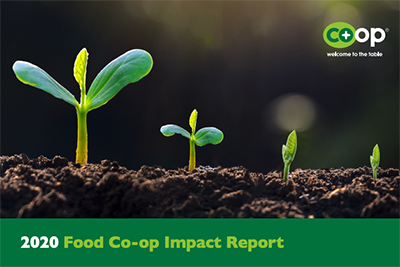
National Co+op Grocers (NCG) last week announced the release of its 2020 Food Co-op Impact Report, a comprehensive look at how retail food co-ops support local communities and economies, create markets for local farmers and producers, make good food affordable for more people and care for people and the planet.
Building Local Food Systems
According to report findings, the average food co-op purchases from 185 local farmers and producers, whose products contribute 22 percent of the co-op’s sales. While co-ops have long been recognized for their support of local food, the report highlights how this approach was put to the test during the COVID-19 pandemic. During the early days of the COVID-19 pandemic, many grocers that rely primarily on national supply chains were unable to keep their shelves stocked.
In contrast, many food co-ops were able to keep foods like meat, produce, eggs and milk on the shelf because of strong relationships with local farmers. In fact, in many states, food co-ops boosted local food inventories to ensure farmers had a market for product that would otherwise have been lost due to restaurants closing.
Making Food More Affordable
The report also highlights the strength of cooperation when it comes to food affordability. Through NCG, food co-ops combine purchasing power on national brands to offer shoppers lower prices and a broader range of products so they have more choices that fit their budget and cooking style. Co-ops’ popular Co+op Deals promotion program, for example, saves customers an average of 25 percent on a selection of more than 2000 items on sale each month.
Recognizing that today’s economy is out of balance and many are struggling to meet basic needs, food co-ops are lowering barriers to healthy food. Three out of four co-ops nationwide now offer a needs-based discount program—and that number has been growing consistently since 2016.
Caring for Each Other and the Planet
As community-owned grocery stores, food co-ops are passionate about collaborating with their community to make positive change. In addition to collectively donating over $7.3 million dollars to community organizations locally in 2020, NCG is also investing in national organizations working to build a more just and equitable food system. The report outlines how food co-ops are prioritizing racial equity, including the launch of a supplier diversity program through NCG.
Food co-ops are still at the top of the marketplace when it comes to products that are better for people and environment—leading the way in sales of organic, fair trade, B Corp and cooperatively produced products. For example, 47 percent of food co-op sales come from organic products, compared with 32 percent at other natural grocery stores and just 3 percent at conventional grocers.
While food co-ops work individually to reduce their carbon footprint, they also collaborate through NCG to reduce the negative environmental impact of their supply chain. Since 2012, food co-ops have been working with fair trade farmer co-ops in Peru to offset a portion of greenhouse gas emissions associated with annual business travel by planting and protecting trees in the Peruvian Amazon. The program—known as Co+op Forest—has helped plant and/or protect more than 1.8 million trees.


